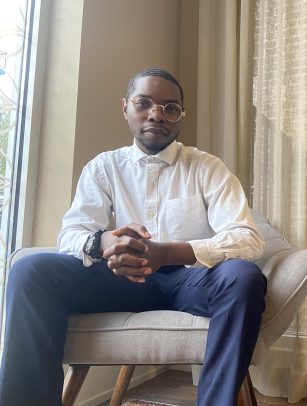Inspiring grads: Parrish Brown Jr.
Community organizing is familiar territory for Parrish Brown Jr., a senior in the College of Urban Planning and Public Affairs. He has been an active member of Chicago’s Kenwood-Oakland neighborhood since sixth grade.
As a child, he attended the Boys to Men program run by the Kenwood Oakland Community Organization (KOCO) and later helped the group advocate and organize through its Leaders Investing for Equality Campaign, which pushes for city and state policies that promote investment in young people. The movement has led to the Community Youth Employment Act, a state bill that financially backed the creation of summer employment programs serving young people who are most in need of these programs in communities across the state.
While still involved with the organization as a Dyett High School student, Brown spent four years organizing and campaigning to keep the school open. The school remains open today as Dyett High School for the Arts, where Brown works as the restorative justice coordinator.
“I am responsible for teaching and getting the principal, students, parents, staff, teachers and community members trained on restorative justice practices. I enjoy facilitating five-week restorative justice experience programs with mostly every Dyett High School student. I enjoy hearing how they are doing, what they want to do, and how I can support them,” he said.
Brown’s college career began in 2014 at Northern Illinois University, where he studied industrial technology management. Later while conducting job shadowing, he felt the major and career were no longer a fit for him. He matriculated to Harold Washington College and earned an associate’s degree in science in the spring of 2017.
He transferred to UIC in the fall of 2017 to pursue a bachelor’s degree in urban studies, as well as his passion for community organizing. After four years that challenged his ability to manage commitments to school and community, he’ll have his degree in urban studies and celebrate commencement in May.
While at Harold Washington and UIC, Brown assisted in KOCO’s five years of work that led to a community benefits agreement between the Obama Presidential Center, the University of Chicago, the City of Chicago and the community. The ordinance aims to protect residents from displacement while addressing matters related to economic development, education, employment, housing, sustainability and transportation.
He also has been involved with efforts to save Mercy Hospital and Medical Center, which threatened to close during the pandemic after months of uncertainty about its future. In early April, a deal was announced that ownership would shift to a Michigan-based nonprofit company that plans to keep the hospital open in the Bronzeville neighborhood.
Brown’s dedication to community organizing and commitments to social justice earned him the UIC Social Justice Initiative’s Pipeline to Justice Scholarship.
He credits his UIC coursework for benefiting the career skills and foundation he’s built for himself through a better understanding of the public policy process and budgeting to visual design and intensive research.
“These different skills have prepared me to push policy in the City of Chicago as it relates to being an instrumental stakeholder in developing a community benefits agreement ordinance for the Woodlawn community,” he said. “All stages from identifying a problem, agenda-setting, policymaking, budgeting, implementation and evaluation are things I clearly understand and have actually done through the Woodlawn Housing Preservation ordinance.
“Also, I’ve learned how to create visual representations through platforms such as Google 3-D SketchUp, Adobe Illustrator, and Adobe Photoshop to represent what is needed or wanted in communities because of my US 304 (Visualizing the City) course. I’ve learned how to conduct intensive research in any community with bar graphs, line graphs, census tracts, and other tools to represent data for a community in my UPP 405 (Researching the City) course.”
He’s currently utilizing these skills to help form a community planning process as an intern in the aldermanic office of 20th Ward Ald. Jeanette Taylor.
Brown admits that it was difficult to maintain a balance between completing schoolwork as a full-time UIC student and responding to issues in South and West Side communities as an active community organizer.
“I found myself having to decide whether I was going to show up and respond to a protest or work on an assignment. I was able to learn how to prioritize my school work and community work by scheduling things in advance, taking off from work to focus on my studies, and completing my school work in sections,” he said.
Brown’s post-commencement plans include continuing his role as a restorative justice coordinator at Dyett while also serving as a housing and neighborhoods pillar hub organizer for a partnership between Honey Pot Performance, a performance art ensemble, and the City of Chicago.
In the next few years, he’s interested in pursuing a graduate degree in urban planning and developing his business Good Lookin Out, which will promote positive messages that inspire people to build relationships with each other through social media and clothing, as well as facilitate four-year high school programs.
“Good Lookin Out is a culture that inspires people to uplift one another and by uplifting others, you uplift yourself,” Brown said.
What is his advice for young Chicagoans?
“Always be a student wherever you go. You are never too old to learn. Keep moving forward, because what the world needs most are people who have come alive,” he said.

